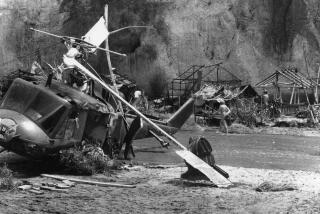Landis asked about wardrobe
- Share via
The legal team prosecuting drug allegations against Tour de France champion Floyd Landis finally got its chance Tuesday to grill the American cyclist about those doping claims.
Instead, the highly anticipated cross-examination explored his wardrobe choices and why he waited overnight to fire a business manager after learning the aide had made an anonymous and potentially threatening call to a witness last week.
Landis defended his delay in firing Will Geoghegan, saying he wanted to consult his lawyers first. The ousted business manager admitted making a call to former cycling star Greg LeMond on the eve of his testimony against Landis.
In the call, Geoghegan alluded to LeMond’s admission months earlier to Landis that he had been sexually molested as a child, a reference LeMond said seemed intended to warn him against testifying. Geoghegan was fired the next day, but only after LeMond took the witness stand and disclosed receiving the call.
Regarding his wardrobe, Landis said that on the day LeMond testified he wore a black suit and black tie instead of his customary gray suit and yellow tie because “it was a terrible day.”
The controversial phone call and Landis’ reaction to it were the main topics of cross-examination by attorneys for the United States Anti-Doping Agency (USADA), which has accused Landis of taking testosterone during the 2006 Tour de France.
It was a curious approach for the agency, which has maintained throughout the proceedings that, as it wrote in its pre-hearing brief, “the heart of this case is [Landis’] positive test.”
Landis’ challenge to the accusation is being heard by a three-member arbitration panel in public hearings convened at Pepperdine. The cyclist faces a two-year ban from competition and the loss of his Tour de France title if the panel upholds USADA and a further appeal to the Court of Arbitration for Sport fails. The arbitrators are scheduled to hear closing arguments today. Their ruling is not expected immediately.
During the brief cross-examination, USADA attorney Matthew Barnett made no effort to pressure Landis into recanting testimony on Saturday that he had never taken a performance-enhancing substance. Nor did he force the cyclist to address the laboratory evidence arrayed against him. Instead, he attempted to undermine Landis’ carefully-crafted reputation for rectitude.
“When you were asked Saturday why this panel should believe you, you said, ‘People are defined by their principles and how they make their decisions,’ isn’t that so?” Barnett recounted, before challenging Landis to explain his failure to act promptly to oust Geoghegan.
Barnett also cited Landis’ increasingly bitter public dispute with LeMond, who had publicly expressed doubts about Landis’ innocence. The dispute culminated with a Landis posting in an online forum in November in which he said he knew “facts” about LeMond that “would damage his character severely” and appeared to hint he might divulge them if LeMond continued to speak out.
Landis replied that he was referring to LeMond’s public contention that “everyone close to him had doped,” not to his troubled personal history. He said he did not fire Geoghegan promptly because he wanted to obtain legal advice first.
Further explaining his choice of black-dominated wardrobe colors, Landis said it was “because it was a terrible day ... Not a day to celebrate with a yellow tie.”
He said he had informed his lawyers of Geoghegan’s call that morning, but they had not had a chance to talk about what to do about it before LeMond mentioned it from the witness stand that afternoon.
LeMond asserted in his testimony that Landis had implicitly confessed to doping with testosterone at the Tour de France in a phone conversation weeks after the race, during which LeMond urged Landis to “come clean.” He said he revealed his personal secret as an example of how he had suffered by bottling up a painful memory. Landis denied making any admission to LeMond.
After Landis’ cross-examination Tuesday, the hearing returned to its customary fare of abstruse scientific analysis with the appearance of Landis’ final defense witness. Simon Davis, an engineer specializing in carbon isotope ratio testing, questioned how that test was performed by a French lab in determining that Landis’ urine sample was positive for testosterone abuse.
Davis witnessed two rounds of lab tests in the French lab on Landis’ behalf before the hearing.
A developer of the very machine that the lab used to perform the tests, Davis condemned the lab’s technicians as scarcely competent operators of the equipment.
“They clearly did not understand the instrument,” he said, adding that at several points during the re-analyses in April and May, he had to instruct the technicians how to use certain functions properly.
*
More to Read
Go beyond the scoreboard
Get the latest on L.A.'s teams in the daily Sports Report newsletter.
You may occasionally receive promotional content from the Los Angeles Times.










